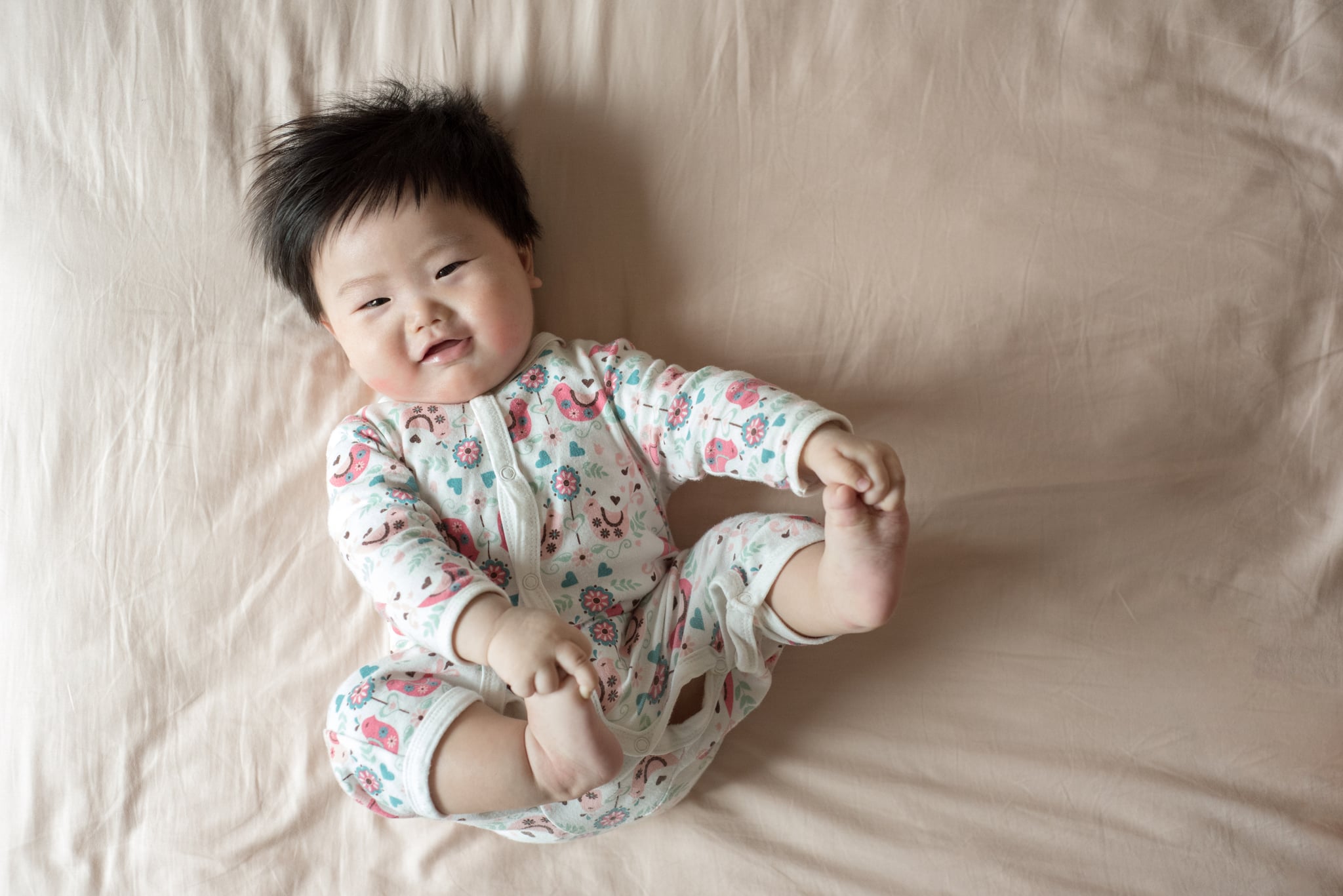
Babies have a superpower — just when you think you've got them figured out, they switch things up on you, catching you totally off guard. How can someone so little be so confusing? As a mother of two, I often wonder about things my kids do, like why they're obsessed with their belly buttons [1], why they sleep on the floor [2], or why they wake up crying hysterically [3]. But one of the questions that I've always wondered about is why babies shake their heads. My sons would do it when laying down to sleep. Is it a form of communication? Is it a sign of something more serious? Is it just silly, harmless fun? I talked to two pediatricians to find out more.
Why Does My Baby Shake Their Head?
There are many reasons babies may shake their heads. Our experts agreed that sometimes it's harmless, but sometimes it may be concerning. "Some babies will shake their heads as a way of exploring their newly discovered body parts," Christina Johns, MD, MEd, FAAP [5], pediatrician and senior medical advisor for PM Pediatrics [6], told POPSUGAR. "When only a few months old, babies discover that they have a head and that it can move so they will practice moving from side to side and up and down. These may be repetitive motions but are not concerning."
For some kids, shaking their head from side to side can be soothing, Mona Amin, [7] DO, FAAP, board certified general pediatrician, podcaster and YouTube Creator of PedsDocTalk [8], and mom, told POPSUGAR. This is very common (and harmless!) especially when they're falling asleep. "If they seem frustrated during a head-shaking episode, calmly redirect them or hold them. If they are happily playing, you don't need to stop them from exploring," she said.
It could even be a form of communication! Shaking back and forth may be their way of saying 'no' to you," said Dr. Amin. "Is it happening when they get a food they don't like or don't want to go somewhere? Remember to hold the boundary and remember this is normal!"
However, Dr. Johns said babies will also shake their heads if they're hurting. "Sometimes babies will shake their heads if they have pain," she explained. "If it's pain-related, one common reason is that they have an ear infection. If not an ear infection, the baby may be congested and sometimes that congestion can be uncomfortable, which leads to head shaking. More serious reasons that can be concerning have to do with developmental delays or neurological disorders. Seizure disorders can sometimes manifest as rhythmic head shaking."
Is It Normal for My Baby to Shake Their Head?
Babies shaking their heads is very normal, especially if it doesn't happen for long periods of time. "If your child only has brief moments where they shake their head but is otherwise acting well, then there is usually no cause for concern," Dr. Johns said. "If the head shaking isn't long-lasting and your child falls asleep normally, and if they continue to engage with you and respond in the way they normally do, then there's nothing to be worried about."
The moment head shaking becomes a concern is when it's accompanied by other symptoms, such as fever, ear drainage, feeling sick, or not eating well. "If your child is head shaking and you are concerned about other domains of development (language, motor skills, etc.), speak to your pediatrician. Also, if they are holding their ears or tugging them, speak to your pediatrician to make sure there isn't an ear infection," Dr. Amin said.
How Do I Know My Baby's Head Shaking Is Concerning?
Because it can be difficult to tell the difference between normal head shaking and head shaking that might be related to a more serious issue, Dr. Johns gave a few tips. "With a neurological disorder or a seizure disorder, motor seizure activity produces rhythmic shaking that will continue even if you try to apply gentle pressure to stop the movement," said Dr. Johns. "For a child shaking their head without a seizure, the gentle pressure will stop the movement, and might be a sign of something less serious like an ear infection. If faced with a child who is shaking their head for a prolonged period, I recommend parents first start with the ABCs in pediatric emergency medicine — airway, breathing, and circulation. We want to make sure the child isn't having any respiratory or difficulty breathing. Once that is determined, if the head shaking is something that is ongoing and does not stop, then it is important to seek medical care right away. Always better to have many fire alarms and few fires."
Don't let occasional head shaking scare you. "If your child is developing well, head shaking is no concern and should be encouraged exploration," Dr. Amin said. "If your child seems frustrated during the episodes, give them some space, but you can also redirect them to other activities or verbally reassure them."
Babies are funny, and they often do things that seem confusing for parents. When it comes to shaking their heads, it's probably normal, but you should trust your gut and get medical attention if you feel anything is wrong.
